- Home
- Jeff Mariotte
Brass in Pocket Page 8
Brass in Pocket Read online
Page 8
“That’s a good idea, Catherine.”
“I know it is.” She smiled and opened her door. “I’m just full of ‘em.”
12
WENDY SIMMS CAUGHT Catherine on her way back into the lab. “Catherine, I got the first results on some of that semen from the motel room scene.”
“Walk with me,” Catherine said. Depending on what those results were, she might not want them broadcast to the whole lab. She desperately did not want to hear about anything else connecting Brass to that room. He still hadn’t called her back or answered his radio.
“Okay,” Wendy said. She fell in step with Catherine.
“What did you learn?”
“It’s a little strange.”
“Just what I need tonight. More strange.”
“I could come back tomorrow night.”
“Kidding,” Catherine said.
“Me too.”
They reached Catherine’s office and went inside. Catherine sat behind her desk. Her voicemail light was flashing, but then again it usually was. “What’ve you got, Wendy?”
“Okay,” Wendy said again. “There’s a DNA match to a guy named Bart Gorecki. He’s in the system because he did time in Folsom for aggravated assault.”
That might have been the best news Catherine had heard all night. “Sounds promising. We need to find out how he knows Deke Freeson, and—”
“Here’s the thing, though.”
“What thing?”
“Bart Gorecki died in 2002. In Folsom.”
“Oh.”
“Yeah, that’s how I felt.”
“You’re sure about that?”
“I’m positive, Catherine. I can bring you the file…”
“That’s not necessary, Wendy. I believe you. Keep working on the rest of it, and we’ll figure this out.”
Wendy left the office. DNA wasn’t foolproof, Catherine knew. It was one of the best tools the CSIs had ever had, but mistakes could be made, either through human error or technical problems.
But still, she hated to have a name in her grasp and then to lose it in the space of mere seconds.
She needed something else to go on, and she needed it fast.
David Hodges was immersed in a document showing the chemical compositions of different brands of brake fluid—who knew there were so many?—when the phone in his lab rang. It took three rings to snap him from his concentration and remind him that he had a phone in the lab—days went by between calls sometimes, although there were also nights it never seemed to let up. This had been one of the former, until now.
He crossed the room and snatched up the receiver. “Trace lab, this is Hodges.”
“Hey, Hodges,” a familiar, gravelly voice said. “This is Brass. How you doing?”
Brass? Calling me? “Captain Brass, this is a surprise. To what do I owe the honor?”
“Apparently there’s an investigation going on around a homicide at the Rancho Center Motel.”
“That would be correct, yes.”
“I tried calling Catherine, but I guess she’s a little busy. And I know you usually manage to stay tapped in to whatever’s going on around there. I was hoping you could bring me up to speed.”
“Oh, wow…” Hodges couldn’t quite believe the captain was calling him for information. That implied a lot of trust. “You know, sir, I haven’t really heard a lot about it yet. I know Catherine and Nick are on it, and Mandy’s working on”—he was going to say “fingerprints,” but decided that sounded too mundane—“friction ridge impressions, and Wendy’s on fluids, epithelials, and hair. So far, all I’ve got is that someone stepped in brake fluid before walking into the room, and that there were a lot of cotton fibers, some silk ones, and tons of nylon, spandex, and the like in the room. Body glitter, too, somebody in there was a big fan of body glitter.” Hookers, probably, they went in for that sort of thing. Or so he had heard. But he didn’t intend to speculate for the captain. Just the facts.
After he was finished with the motel room’s trace, he had soil from an animal burial pit waiting for him. He was in no great hurry to get to that—dead animals were terrible and all, but a lesser priority than a dead man and a missing woman.
“So you don’t know where things stand in general? No suspect identified, anything like that?”
Hodges wished he’d been able to get out of his lab more, or had been able to pry something out of Nick Stokes when they had last spoken. He didn’t want to let the captain down, but he genuinely didn’t know, and lying to him was out of the question. “I, uhh, I’ll try to find out for you. You want me to call you back?”
“I’ll check in with you when I have a chance. Thanks, Hodges.” Brass ended the call abruptly.
It was kind of amazing, Hodges thought, that the captain would call him, and not somebody like Nick Stokes or Greg Sanders when he had been unable to get through to Catherine. Maybe he was higher up on the totem pole than he realized.
Not as high as he should be, of course. With Grissom out of town, they should have asked Hodges to run the lab. Not that there was anything wrong with Catherine’s leadership, but she was more valuable out in the field. Hodges had been in the field, and he didn’t much like it. The field could be filthy and frequently disgusting, and the extremes of weather were unpleasant. Only someone like Greg Sanders could actively seek to exchange the safety and comfort of the lab, with its climate-controlled sterility, for fieldwork. Not for me, Hodges thought. But putting him in charge of the lab? He would have the place running like the proverbial welloiled machine in no time. His genius didn’t just lie in science, but in organization as well.
And people skills.
Okay, maybe not so much the latter—at least, people didn’t always seem to appreciate those skills the way they should.
But organization?
Pure genius.
Walking to the morgue, Riley couldn’t help wondering about the sort of person who would make a career out of opening up dead people and looking inside. It seemed, on the surface, such a ghoulish practice. The human body, people said, was a beautiful thing, and in the abstract, she couldn’t argue with that. But they were generally talking about the outside when they said that. The inside looked basically like a bunch of raw meat carried around in a bag of skin—and that was when the internal parts were healthy. When the organs were diseased or otherwise distressed, they stopped looking so much like meat. There wasn’t much she could compare a heavy smoker’s lungs to, or a big drinker’s liver, or an ulcerated intestine. She stopped trying, because she was verging on the ghoulish now herself.
Doc Robbins was no ghoul. He was, in fact, one of the most centered people she knew. He had a life among the living—a family, hobbies, and interests. He was smart, educated, and well informed. He didn’t seem to have an unhealthy fascination with death. Instead, he was abundantly alive, and one of the few people she came into contact with regularly who seemed to appreciate her sense of humor, and who could give it back in kind.
She had heard that Albert Robbins had grown up around medicine. His mother had been a nurse, and he had always intended to become a doctor. According to the stories she had heard, the accident that claimed his legs also reshuffled his priorities, causing him to direct his medical practice toward helping the less fortunate, until economic circumstances forced him to close his clinic’s doors. After that he became a coroner, and eventually moved to Las Vegas as chief medical examiner.
A reasonable career path, all things considered. Still… she worked with dead bodies on a neardaily basis too, but she left them behind, or stayed put to investigate the scene while they were taken away. If this job had required her to stick her hands inside them as a regular practice, she would probably turn to teaching or selling insurance or carrying the mail.
The only career that might be worse was the one her parents had embraced—sticking their hands (metaphorically anyway) into the brains of live people. Psychiatrists, she thought sometimes, were the closest things she
knew of to socially acceptable zombies, always on the prowl for more brains to consume.
She pushed open the door and stepped into the morgue. As always, the cold bit at her cheeks.
“Good evening, Riley,” Doc Robbins said. He was, as usual, up to his elbows in gore. “Thanks for coming down.”
“Is that Jesse Dunwood?”
“It is. Would you like a closer look?”
“I’m fine right here, thanks.”
“It’s really quite interesting. Have you ever seen the effects of carbon monoxide poisoning?”
“Only from the outside.”
“It turns the blood and some internal organs a vivid red color. Really very attractive, almost cheerful. You might think of it the next time you get an ice cream sundae with a cherry on top.”
“Does that mean the carbon monoxide poisoning is definitely our COD?”
“That’s correct. To be more precise, the mechanism of Mr. Dunwood’s death was asphyxiation. Carbon monoxide binds easily to hemoglobin, producing carboxyhemoglobin. Carboxyhemoglobin contains no usable oxygen, so it can’t supply needed oxygen to the body’s tissues. Mr. Dunwood’s saturation level is sixty percent, which in any human will cause almost certain death by asphyxia. He stopped breathing, therefore he died.”
“Got it,” Riley said. The takeaway message was that the cause of death was asphyxiation, but the reason for that was the carbon monoxide pumped into the airplane’s cockpit. So whoever had punctured the muffler and run the hose to the vent had, in fact, murdered Jesse Dunwood—giving Riley a third important piece of information. The manner of death. Homicide. Mechanism, cause, and manner—the building blocks she needed to begin making a case. “Thanks, Doc,” she said, starting back through the doors.
“I hope I haven’t put you off sundaes,” he called.
Riley stopped in the doorway. “We should get one together sometime,” she said. “Extra cherries.”
“That sounds like fun.”
She let the door swing closed.
Ice cream with a coroner.
Fun times, indeed.
13
“SUPERVISOR WILLOWS.”
“Catherine, it’s Sam Vega.”
“Hi, Sam,” Catherine said. The detective wouldn’t call her just to pass the time. She hoped he had good news for her, because she was more than ready to hear some. “What’s going on?”
“You asked for a heads-up, so I’m giving you one. I don’t know yet if this is anything, and it’s way too early to tell if it’s going to be. But we’ve had a report of a young woman missing from the Palermo.”
So much for good news, but she couldn’t deny that it was news. “Missing how long, Sam?”
“She hasn’t been seen since seven-thirty.”
“Tonight?” Catherine glanced at the clock. Just past midnight. Early still. Casinos didn’t put up clocks because they didn’t want people knowing just how long they had been throwing their money down, and it was easy to lose track of time.
“Yeah, tonight.”
“What’s the story?”
“Her name is Melinda Spence. Twenty-two years old. She’s here from Hamilton, Ohio, for a family reunion. They’re all staying at the Palermo, on one of those group-rate deals. She showed up for a buffet dinner, then said she was going to go play the quarter slots for a while before they all went to a ten o’clock show. Ten o’clock came and went, and she didn’t make it to the meeting place. She’s not answering her phone. Family members say she’s just about the most reliable person on the face of the earth.”
“Family members can be remarkably ignorant about one another,” Catherine pointed out. She wouldn’t have minded having slightly less personal experience with that truism. “Ignorant, blind, or both.”
“True. That’s why I’m saying I don’t know what the deal is on this yet. She might have met someone and is getting busy in one of their rooms right now. She might have gone to another casino, isn’t wearing a watch, whatever. It’s early, by Vegas standards. And you know people sometimes act out of character here.”
“Right.”
“So maybe she’s just ignoring her phone. It’s been known to happen.”
“Yes, it has.” Lindsey had made a science of it. If Melinda Spence needed any excuses later, maybe Catherine could put the two of them in touch. Unless of course Lindsey ignored the phone when Catherine called her about it.
“But you said you wanted to know about any disappearances or unsolveds that turned up. Her family’s worried about her, and their worry feels like the real deal to me. I can’t launch an investigation yet, until more time passes or we have some reason to suspect foul play, but I just wanted to tip you off.”
“Okay, Sam, thanks. I’ll drop in on the family and have a look around.”
“Let me know if you find anything useful, Catherine. ’Bye.”
She sat at her desk for another minute, pondering the situation. Sam was right: a young woman, in Las Vegas for maybe the first time, could get involved in all sorts of things that she might not want the rest of her family to know about. It didn’t necessarily mean she was in any danger.
But her family was worried, and given Greg’s theory about a would-be serial killer preparing to make the move to human victims, maybe it had reason to be. She couldn’t discount the possibility, however remote. One missing woman was plenty for one night, and now it appeared that she might have two on her hands.
She called Greg into her office and described the situation as Sam had outlined it.
“I should get over to the Palermo,” he said when she had finished. “And those bones should be moved up on the lab’s priority list. They’re the key to this whole thing.”
Catherine had to admire his enthusiasm. “So far, they’re still just animal bones, Greg, and we have plenty going on here tonight. Jesse Dunwood is a dead human being, and Antoinette O’Brady is a missing human being. Melinda Spence might also be missing, but we don’t know that for certain. The other, more concrete issues have to take precedence.”
“I know,” he said bitterly. “Sometimes I want to clone myself so I can be everywhere at once.”
“I know the feeling, Greg. Dunwood is your first case, and now we know it was a homicide. Get back out to that airport and finish processing that airplane.”
“That could take hours, Catherine!”
“It’ll take as long as it takes. Go with Riley and get it done.”
He looked like he wanted to say something else, but he didn’t.
He was smart enough to rein himself in when he needed to. He had made the right choice this time, because Catherine was in no mood to be secondguessed.
This was the boring part of the job.
Greg and Riley had already checked out the airplane and photographed it extensively. Officer Morston swore that no one had touched it in their absence.
Which meant it was time to go over the aircraft, inch by inch, looking for the minutest bits of possible evidence. Riley got a small handheld vacuum cleaner and started on the cockpit floor, picking up whatever dirt and fibers might have been dropped there. Those had probably mostly come from Dunwood himself, but the killer would have had to enter the cockpit to position the tube just right behind the vent. The Locard exchange principle said that any time a person comes into contact with another person, place, or object, there’s an exchange of materials, each leaving some trace of the event on the other. Modern forensic science was largely based on that principle, and exceptions were rare indeed. So if the murderer had been inside the cockpit, there should be some sign of his or her presence there. Greg and Riley couldn’t fathom any way to have placed the tube without entering the cockpit.
While Riley worked inside the plane, Greg landed the unenviable task of examining the engine, muffler, and tube. Taking apart an airplane was a dirty job, so it was possible that he would be able to find greasy fingerprints. In fact, he did, all over and around the muffler. He photographed these visible prints, known as patent pr
ints, then lifted them with tape. Easy part done. Now he had to look for the latent impressions, ones that couldn’t be seen with the naked eye. Even very clean hands left faint oily traces on surfaces they touched, and engine parts were ideal depositories for them.
“You’re back,” a voice called from the hangar door.
Greg turned around. Jamal Easton looked in at him, head gleaming in the hangar’s overhead lights. “This is a secure area, Mr. Easton.”
“I understand. I’m not coming in. I just wanted to see how your investigation’s going.”
“It’s a laborious process.” The vacuum cleaner was still humming inside the cockpit—Riley might not even be aware they had a visitor.
“I bet it is.”
“Is there something I can do for you?”
Jamal shoved his hands deep into his hip pockets and swayed from heel to heel. He looked like a shy kid asking a girl to the movies. “I just thought maybe you should know something, in case it’s important,” he said. “Jesse Dunwood? I mean, I liked him, and he was a hell of a pilot. Always nice enough to me. Some folks look down on mechanics, but not Jesse. But here’s what you should know. He was having a thing with Tonya Gravesend.”
“A thing? You mean an affair?”
“That’s right. It was hot and heavy for a while there. But he broke it off, a couple of weeks ago.”
“Was he married?”
“Oh, no, not Jesse. He liked to play the field, always squiring some new babe around. That was a holdover from his jet jockey days, I think. Women go for pilots, and there’s a certain type drawn to fighter pilots. Nobody could tie him down. I don’t know why he broke up with Tonya, but she was stomping around here for days, slamming doors and shooting him the dick-eye every time she saw him. I overheard her talking on her cell phone to a friend, and Jesse’s name came up in a derogatory way. A less charitable man might even say threatening. I got the feeling he was kind of a jerk to her.”
“Did you tell all this to Detective Williams?”
“Oh yeah. I told him the whole deal.”

 City Under the Sand
City Under the Sand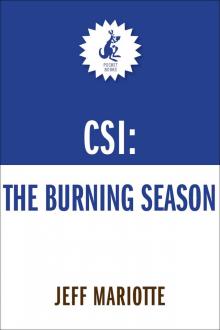 The Burning Season
The Burning Season Sanctuary
Sanctuary Winds of the Wild Sea
Winds of the Wild Sea Serpents in the Garden
Serpents in the Garden Close to the Ground
Close to the Ground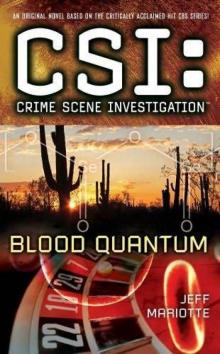 Blood Quantum
Blood Quantum Brass in Pocket
Brass in Pocket City Under the Sand: A Dark Sun Novel (Dungeons & Dragons: Dark Sun)
City Under the Sand: A Dark Sun Novel (Dungeons & Dragons: Dark Sun) Witch's Canyon
Witch's Canyon STAR TREK: The Lost Era - 2355-2357 - Deny Thy Father
STAR TREK: The Lost Era - 2355-2357 - Deny Thy Father Dawn of the Ice Bear
Dawn of the Ice Bear The Xander Years, Vol.2
The Xander Years, Vol.2 Ghost of the Wall
Ghost of the Wall 30 Days of Night: Light of Day
30 Days of Night: Light of Day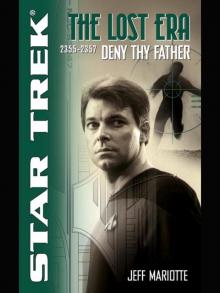 Deny Thy Father
Deny Thy Father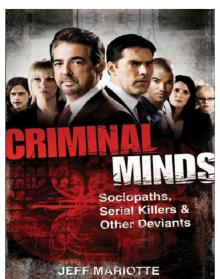 Criminal Minds
Criminal Minds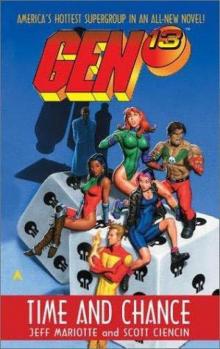 Time and Chance
Time and Chance The Folded World
The Folded World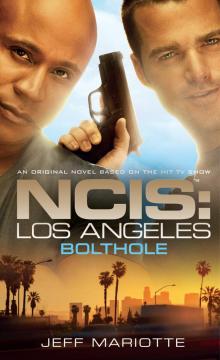 Bolthole
Bolthole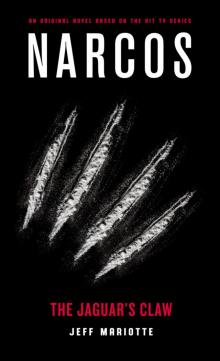 Narcos
Narcos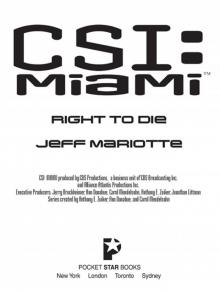 Right to Die
Right to Die